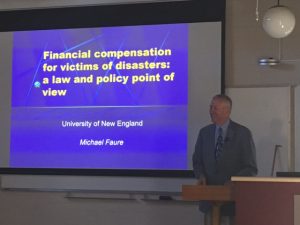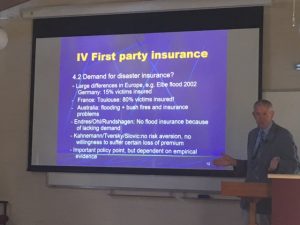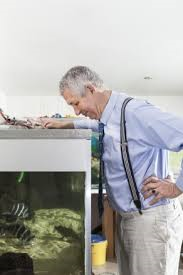The UNE School of Law has been blessed with the company of Professor Michael Faure recently.
Michael comes from Limburg in Belgium. When Michael was telling me about his home town, I was in absolute awe. You see, each day when Michael travels to work, he goes through Flemish, French and Dutch speaking countries! Also, on the weekends, Michael and his family are able to choose to have a beer in Germany or Moroccan cuisine in Liege!
Just as I was about to buy my air ticket to Limburg, Michael told me how much he loves Australia. He noted the feeling of space we have in Australia and the friendliness of the people. He also thinks our landscape and wildlife is beautiful!
After completing his schooling, Michael originally wanted to study economics, but as he did not complete enough maths at school, he was unable to study this and had to choose between law and languages. He chose law.
After completing his undergraduate law degree in Belgium, he completed his master’s degree in Chicago, which he absolutely loved! Whereas in Belgium he was taught black letter law, in Chicago, Michael was taught to see law as a vehicle for changing society. This American economic approach resonated with Michael!
Michael was later invited to enrol in a PhD at the Max Planck Institute for Foreign and International Criminal Law. This was an amazing opportunity, but there was one small problem. You see, Michael told his supervisors that he was able to speak German. He failed to mention that the only German he knew was words and phrases he had learnt from his mate Wolfgang in the beer halls of Germany!
Notwithstanding this fact, Michael completed his PhD. He then became the only academic in Belgium who wrote about environmental criminal law. He used his theoretical knowledge to defend the government against polluters.
The other very interesting aspect of my discussion with Michael, was how important economics is to environmental protection. Even though intuitively we may view economics and the environment as contradictory terms, any economist will tell you that profits should not be pursued at all costs. Economics is able to teach us how different policy instruments can effect human behaviour. In other words, economics can be used as a tool to predict the effectiveness of plans to protect the environment.
We also spoke of the importance of legal rules and human behaviour. Legal rules are not the only reason people behave in the way they do. One example Michael gave of this proposition was when we drive. Most of us don’t only drive carefully so as not to breach the applicable laws. When driving we are also concerned about not causing ourselves or others harm. The same thing can be said for the environment! People don’t only want to protect the environment for legal reasons. This is why it is so important for people to understand how their behaviour may have an impact on the environment.
Michael visited the UNE School of Law after meeting Professor Paul Martin at the IUCN Environment Conference. The two professors became friends and Paul invited Michael to visit us at the UNE School of Law.
Whilst visiting UNE, Michael presented an excellent Kirby seminar on ‘Financial Compensation for Victims of Disasters: A Law and Policy Point of View.’ Interestingly enough, Michael, after first writing the seminar presentation, decided to scrap his draft after looking at the Australian landscape. You see, the Australian context is different in terms of insurance and disaster management, as opposed to Europe or America. Surprisingly, even though the image of Australians is of laid back happy go lucky types, Australians are actually quite risk averse! They have considerably higher rates of disaster insurance coverage than other countries!
Michael spoke about the instruments which can be used from a law and policy perspective to provide victims of disasters with compensation. He also drew the distinction between natural disasters, such as bushfires and floods, technological disasters- which are man- made- and terrorism. Terrorism is interesting, as even though it is a man-made disaster, the repercussions are usually more similar to a natural disaster!
There are different schools of thought in terms of how it is best to help victims of disasters. Some say the government should take more responsibility when disaster strikes. The primary argument against this is, governments should not pretend to be Santa Claus! Also, relying on government intervention will mean that there are less incentives for people to take out their own insurance coverage.
Other commentators would argue it is better to encourage people to take out their own insurance for disasters. This has other ramifications though, as insurers may put restrictions on giving coverage- such as only covering premises which have adopted an earthquake proof construction in earthquake prone areas.
When Michael is not working, he enjoyed spending time with his 6 kids who range in age from 32 to 1 years old, as well as 3 grandchildren. The large family often holiday together in Corsica in the Mediterranean. Michael is passionate about fish! Instead of only being interested in eating and catching fish, Michael loves fish as pets. At home, he has lots of aquariums where he can watch them interact and live. Some of the most exciting times in Michael’s life have been when he has purchased or discovered a species of fish he did not know existed. He also likes walking and hiking in nature!
Michael has met some really interesting people in his life. He saw David Bowie in concert before he died, and has also met two Prime Ministers from The Netherlands. In addition to meeting many distinguished and well known academics, Michael has shaken hands with Queen Beatrix of the Netherlands!
Thank you Michael for sharing your fascinating story with us!






